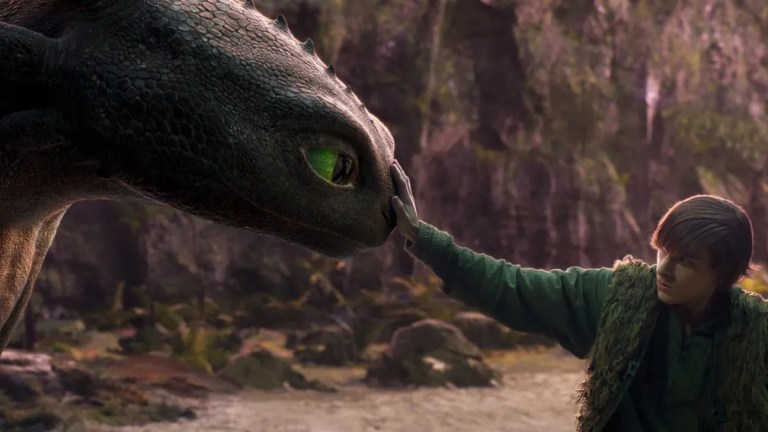How to Train Your Dragon Movie Needs to Overcome Disney Remakes’ Worst Flaw
In a cinematic landscape littered with live-action remakes, DreamWorks Animation can separate How to Train Your Dragon from the pack if they avoid one of Disney's crucial mistakes.

Live-action adaptations of beloved animated movies are nothing new. Disney has been creating such films for three decades. However, they didn’t hit their stride until the last 10 years or so. After the immense success of Alice in Wonderland (2010), Maelficent (2014), The Jungle Book (2016), Beauty and the Beast (2017), and many others, Disney has delved deep into their vault, seemingly remaking every popular animated property they have at their disposal.
It was only a matter of time before another animation powerhouse dipped their toes in these waters, and DreamWorks Animation has unsurprisingly become the first to bite. The 21st century rival of the Mouse House will release its first photorealistic remake next summer with the relatively recent classic How to Train Your Dragon (2010) receiving the live-action treatment. Unsurprisingly, this announcement drew immense skepticism from fans, especially those who feel burnt out from Disney’s assembly line retreads. But with the release of the first trailer for the new rendition, sentiment appears to be shifting on social media.
So, why are devotees championing DreamWorks’ first attempt while simultaneously pessimistic about every Disney live-action adaptation?
The “Ugly Sonic” of it All
No, Sonic the Hedgehog is not a Disney nor DreamWorks character, but he did make a hilarious cameo appearance in Chip’ n Dale: Rescue Rangers (2022). So the blue speedster feels relevant enough for this analogy. In 2019, Paramount Pictures released the first trailer for the live-action Sonic the Hedgehog movie. To say reception was negative would be an understatement. Paramount was ridiculed by online fans for the movie’s radical design of Sonic. Aficionados of the video game character felt like they massacred their boy. Paramount delayed the movie and heavily retooled the character design to greatly resemble what fans of the Sega character appeared like in their childhoods. They were rewarded with a box office hit.
Nonetheless, in the aforementioned Chip’ n Dale romp, the original Sonic look, now called “Ugly Sonic,” appears for one of the movie’s most memorable meta gags. He’s pictured as a down-on-his-luck wannabe yearning for the glory days that’ll never come again, cementing his place in infamy in the pop culture zeitgeist.
Back in 2019, the decision by Paramount to delay the first Sonic the Hedgehog appeared to be a simultaneously bold and desperately risky move. But it paid dividends for the studio, as the Sonic flick became one of the most successful video game adaptations of all time that has since spawned a franchise of sequels and streaming service TV shows.
Which brings us back to How to Train Your Dragon. While watching this first teaser, it becomes apparent that “live-action” Toothless (or realistically rendered) is more new-Sonic and less Ugly Sonic. Now compare this with how Disney has over-designed their animated characters when making the transition to photorealism. Inanimate objects like Lumière and Cogsworth from Beauty and the Beast (1991) went from being simplistic and cute to nothing short of horrifying and unpleasant in the 2017 film. The kooky characters of Alice in Wonderland (2010) unsettled audiences across the globe while the carriage from Cinderella (2015) was littered with a busy aesthetic.
To view the most egregious example of Disney overdoing it with their live-action adaptations, look no further than the animal players seen throughout their films. The lions in the 2019 The Lion King remake just look like normal lions. Gone are the expressions of the revered animated picture, replaced with ironically lifeless interpretations of the quadrupedal characters. Despite impressive work from the CGI artists, the 2019 rendition of The Lion King lacks soul, partly due to the emotionless look on the big cats’ faces, especially while singing.
The Little Mermaid (2023) remake faced a similar issue. Sebastian and Flounder went from being creative cartoons of a crab and fish to highly realistic depictions of the animals—the latter appearing especially creepy to audiences. This looked especially awkward during musical numbers, making viewers feel detached from the source. While Disney’s promulgation to make the film as earthly as possible makes sense on paper, one starts to question the decision of why realism is necessary in the movie about mermaids and undersea kingdoms.
For DreamWorks’ foray into live-action to succeed, they must dodge this. Even with just one brief teaser released, How to Train Your Dragon is avoiding this predicament. Toothless looks like Toothless. Of course he has more detail than the animated variation, with attention paid to specific characteristics of the dragon on his scales, retinas, and movements. But ultimately it’s undeniably Toothless, and fans are embracing the accuracy with open arms. Whether or not the film will connect fully with audiences is to be determined, but DreamWorks is off to a good start convincing fans that the How to Train Your Dragon remake is more than a soulless cash grab.
